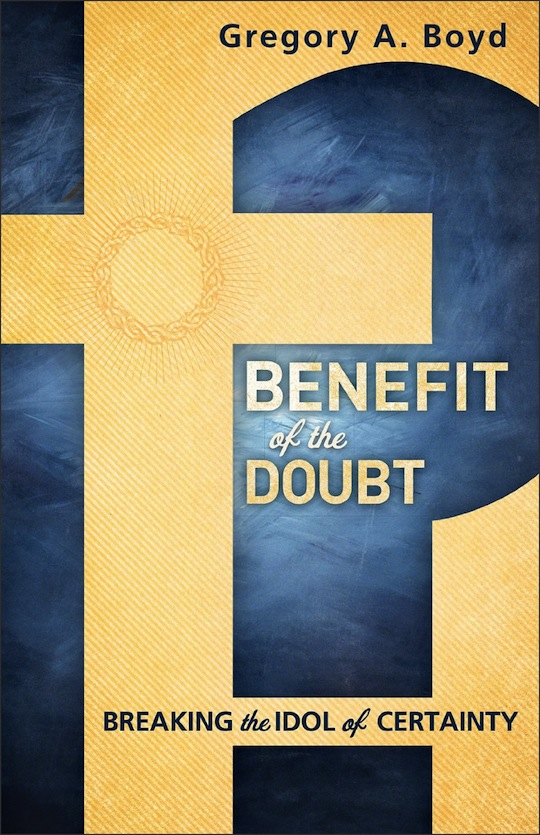We run our website the way we wished the whole internet worked: we provide high quality original content with no ads. We are funded solely by your direct support. Please consider supporting this project.

Benefit of the Doubt Is Here!
Benefit of the Doubt is finally here and you should definitely get yourself a copy! Frank Viola interviewed Greg about the book recently and you can read it over on Frank’s blog Beyond Evangelical. In fact, Frank is so enthusiastic about the book that he added it to his Best 100 Christian Books Ever Written list. Wow.
Also, for those of you who are waiting anxiously for Greg to complete Crucifixion of the Warrior God, you might be interested to know that there’s an entire chapter of Benefit of the Doubt dedicated to giving us a simplified idea of where he’s going with his cross-centered reading of all Scripture.
From the interview:
Whereas most Christians believe in Jesus because they believe in the Bible, inBenefit of the Doubt you advise people to believe in the Bible because they believe in Jesus. What do you mean by this, and why do you feel it is important?
Greg Boyd: The number one reason why young people today are abandoning the Christian faith and why other people can’t take the Christian faith seriously has to do with problems they have with the Bible. For example, as most freshmen who take a course in “The Bible as Literature” at a secular University learn, the historical accuracy of some biblical stories is questioned by many scholars, and its hard to deny that the Bible contains some apparent contradictions as well as some material that seems to fly in the face of modern science. In Benefit of the Doubt, I share my own experience of losing faith as a freshman at a University for these reasons.
I now see that this mass exodus from the Christian faith is as tragic as it is unnecessary, for I maintain that if we structured our faith the way the earliest Christians did, the many problems people have with the Bible would pose no threat to our confidence in Jesus being Lord and even to our confidence that the Bible is the inspired Word of God. The reason these problems destroy the faith of so many today is because evangelicals todaydon’t structure their faith the way they earliest Christians did.
Here’s what I mean. The earliest disciples didn’t believe in Jesus because their Scripture (the OT) proved to them that he was the Son of God. They were rather convinced by Jesus’ claims, his unique life of love, his distinctive authority, his unprecedented miracles, his self-sacrificial death, and especially his resurrection. Once they believed in Jesus, they then looked for him and found him in their scripture. But they never would have been convinced that Jesus was Lord had they started with scripture alone.
Unfortunately, most evangelicals today are taught to do the exact opposite. They base their faith in Jesus’ Lordship (as well as everything else) on their belief that the Bible is the inspired Word of God. This is unfortunate because this way of structuring our faith leverages everything on the supposed perfection of this book (hence all the clamoring over “the inerrancy” of the Bible), forcing the Bible to carry more weight than it was ever meant to carry. In this way of structuring faith, every single problem someone finds in scripture threatens to undermine their faith – and there are, quite honestly, a multitude of these potential threats.
As I flesh out in Benefit of the Doubt, I eventually came to the conclusion that the things about Jesus that convinced the earliest disciples that he was Lord continue to be compelling enough to convince open-minded people today that Jesus is Lord, and they do not presuppose the view that the Bible is the inspired Word of God. Once I was persuaded on the basis of historical, philosophical and personal arguments that Jesus was Lord, I was motivated to also embrace the Bible as God’s Word, for (among other things) this was clearly Jesus’ own view and it’s very hard to confess Jesus to be one’s Lord while correcting his theology, especially on such a fundamental matter. But notice, my reasons for believing in Scripture are now based entirely on my faith in Jesus, which is why my faith need not any longer be threatened by any historical inaccuracies or contradictions or scientific inaccuracies I may find in it.
Category: General
Tags: Benefit of the Doubt, Bible, Cruciform Theology, Doubt, Faith, Frank Viola, Greg Boyd, Interview, Jesus
Related Reading

The Cruciform Center Part 1: How Matthew, Mark and Luke Reveal a Cruciform God
In the previous series of posts I’ve argued that a merely “Christocentric” approach to God is too general, as can be shown by the widely different conceptions of God people arrive at, despite their claim to be “Christocentric.” The confession that Jesus reveals what God is like is simply too abstract, for it leaves too…

Is the Book of Acts Reliable?
(Note: We apologize that certain German vowels didn’t translate onto this site). Introduction The book of Acts is of critical importance in the contemporary debate about the historical Jesus. The reason for this is straightforward. Those who deny that the original, historical Jesus made divine claims for himself, performed miracles and rose from the dead…

Making Room for Doubt and Questions in Our Youth Curriculum
This article from a Christianity Today blog was sent to us from a reader (Thanks Laura!) reflecting on the need for making space for doubt and questions in our youth curriculum. From the article: In our Sticky Faith research, geared to help young people develop a Christian faith that lasts, a common narrative emerged: When young people asked…

Sermon: Blood and Water
In this sermon clip, Greg Boyd talks about how question in baptism and communion have cause division in the church throughout history. In the rest of the sermon he discusses why baptism and Communion are important sacraments to the Christian community. Greg also shows us how the Anabaptists understood these sacraments and how Woodland Hills…

Why Did It Take SO Long for God to Reveal Himself in Jesus?
Greg talks about why it took God so long to reveal himself in Jesus. http://traffic.libsyn.com/askgregboyd/Episode_0048b.mp3
